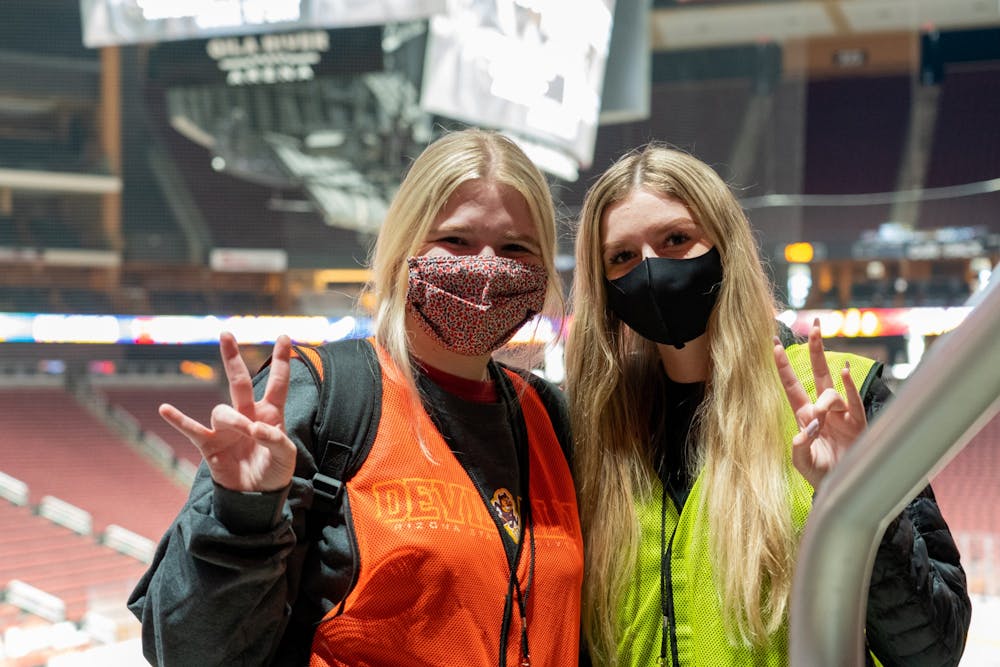Vaccine supply, proper signage and a reliable check-in system are among the components needed for an effective vaccination site. But manpower, in the form of workers and volunteers, is key to ensure the public can be vaccinated safely and efficiently.
Over the course of the Spring 2021 semester and into the summer, ASU students have helped form that manpower at COVID-19 vaccine sites in Arizona and have worked at almost every stage of the vaccination process — from administering the vaccine itself to traffic control and hospitality.
Students from the Watts College of Public Service and Community Solutions specifically have put in over 12,000 hours of work at ASU-run state vaccination sites, according to Erin Schneiderman, a clinical assistant professor at Watts College.
In January, Schneiderman was getting her COVID-19 vaccine at State Farm Stadium in Glendale when she realized mass vaccination sites were an opportunity to get her students involved with serving the Arizona community.
"Very quickly, I realized that everything that we do at the sites is an event. We have everything from technology to staffing, to communications, printing, collateral, everything," Schneiderman said.
Schneiderman contacted David Thomas, CEO of Arizona State University Research Enterprise, "ASU's applied research and development arm" which helps run three mass vaccination sites in the state, about ways to give Watts College students the chance to work at the sites. Thomas quickly agreed, and Schneiderman then reached out to students.
Soon, Schneiderman said, students across disciplines and outside of Watts College got involved with both working and volunteering at the sites.
"So it's about 40 students, at last count from Watts, and then it's a combination of everything. It's nursing, it's computer science, it's anybody that wants to make an impact in the community," Schneiderman said.
Rachel Williams, a recent graduate with degrees in marketing and sports business, said she has learned many lessons relating to troubleshooting and problem solving while working at the Gila River Arena site.
"It also teaches us how to work quickly because we are kind of on a timer because we don't want people to be here too long because then they get upset," Williams said.
Kiana Cripps, a senior studying nonprofit leadership and management, said working at the Gila River Arena site also taught her valuable soft skills and how to interact with people in stressful situations. She said that she and other workers have to handle "people that are either scared or anxious, mean, sometimes who are not having the best day, so (we try) to figure out how to help them."
Cripps added that with children age 12 and older now able to receive the Pfizer COVID-19 vaccine, the volunteers are "trying to make them feel as comfortable as possible because a lot of them are really scared" about receiving their dose.
Students from the Edson College of Nursing and Health Innovation have also been involved with vaccinating Arizonans since early 2021, said Salina Bednarek, clinical assistant professor and director of prelicensure programs at Edson College.
To help ensure a consistent workforce at the Phoenix Municipal Stadium vaccine site, Edson College assigned a portion of students' clinical hours to the site from February to April. In total, 216 students worked at the site, Bednarek said.
Students not only got to administer the injections, practice hand hygiene and use other safety measures, but they also had the chance to educate the patients about the COVID-19 vaccine, Bednarek said.
The Phoenix Municipal Stadium site has since transitioned to Desert Financial Arena, ending Edson College's program for its students to volunteer, but students from the college are continuing work with community partners around the Valley such as Dignity Health and Banner Health.
READ MORE: State-run COVID-19 vaccination site opens at Desert Financial Arena
"Getting the opportunity to interact with patients at that level is a once-in-a-lifetime opportunity," Bednarek said.
By involving such a wide variety of medical professionals, including students, the public gains a deeper understanding of the health care response to crises such as the pandemic, she said.
"When a patient would go out to a vaccine clinic ... they'd see a very wide variety of individuals who contribute to the overall health of our community and in many ways, but yet can pull together in a unique common thread of our community health," Bednarek said.
Clarification: This article was updated at 10:10 a.m. on May 30 to clarify the role of Watts College students at the vaccine sites.
Reach the reporter at alcamp12@asu.edu and follow @Anna_Lee_Camp on Twitter.
Like The State Press on Facebook and follow @statepress on Twitter.
Continue supporting student journalism and donate to The State Press today.




